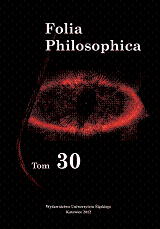Rola analizy w "Tractatus logico-philosophicus" Ludwiga Wittgensteina
The role of analysis in "Tractatus logico-philosophicus" by Ludwig Wittgenstein
Author(s): Szymon MakułaSubject(s): Philosophy
Published by: Wydawnictwo Uniwersytetu Śląskiego
Keywords: Bertrand Russell; Ludwig Wittgenstein; logical analysis; "Tractatus logico-philosophicus"; On Denoting; analytical philosophy
Summary/Abstract: The aim of the paper is to compare the role played by logical analysis in Wittgenstein’s Tractatus logico-philosophicus and Russell’s On Denoting. Whereas in Russell’s work it is an important element of his argument in support of description theory, in his pupil’s it does not function this way. Russell, while analysing various propositions, including descriptions translates them into formal language, indicating that those propositions, despite the appearances, in fact do not denote. Logical analysis shall be a tool decisive in favour of Russell’s thesis. Wittgenstein similarly analyses some troublesome propositions (i.e. philosophical theses) and claims that they are meaningless. The difference is that Russell’s final conclusion is derived from logical analysis, whereas Wittgenstein’s from pure speculation. In Tractatus logico-philosophicus logical analysis is not a method thanks to which the author gets certain result, just as it was the case with his teacher and his On Denoting. In Wittgenstein’s early philosophy logical analysis concerns just a few technical problems connected only to some ideas from Principia mathematica, and not to the main subject of his work, which is the analysis of philosophical theses.
Journal: Folia Philosophica
- Issue Year: 2012
- Issue No: 30
- Page Range: 221-238
- Page Count: 18
- Language: Polish

